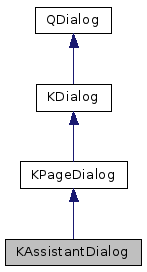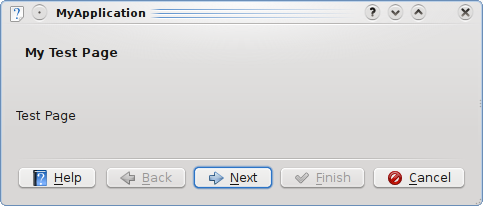KDEUI
#include <kassistantdialog.h>

Public Slots | |
| virtual void | back () |
| virtual void | next () |
 Public Slots inherited from KDialog Public Slots inherited from KDialog | |
| void | delayedDestruct () |
| void | enableButton (ButtonCode id, bool state) |
| void | enableButtonApply (bool state) |
| void | enableButtonCancel (bool state) |
| void | enableButtonOk (bool state) |
| void | enableLinkedHelp (bool state) |
| bool | isDetailsWidgetVisible () const |
| virtual void | setCaption (const QString &caption) |
| virtual void | setCaption (const QString &caption, bool modified) |
| void | setDetailsWidget (QWidget *detailsWidget) |
| void | setDetailsWidgetVisible (bool visible) |
| void | setHelp (const QString &anchor, const QString &appname=QString()) |
| void | setHelpLinkText (const QString &text) |
| virtual void | setPlainCaption (const QString &caption) |
Protected Member Functions | |
| KAssistantDialog (KPageWidget *widget, QWidget *parent=0, Qt::WindowFlags flags=0) | |
| virtual void | showEvent (QShowEvent *event) |
 Protected Member Functions inherited from KPageDialog Protected Member Functions inherited from KPageDialog | |
| KPageDialog (KPageWidget *widget, QWidget *parent, Qt::WindowFlags flags=0) | |
| KPageDialog (KPageDialogPrivate &dd, KPageWidget *widget, QWidget *parent, Qt::WindowFlags flags=0) | |
| KPageWidget * | pageWidget () |
| const KPageWidget * | pageWidget () const |
| void | setPageWidget (KPageWidget *widget) |
 Protected Member Functions inherited from KDialog Protected Member Functions inherited from KDialog | |
| KDialog (KDialogPrivate &dd, QWidget *parent, Qt::WindowFlags flags=0) | |
| virtual void | closeEvent (QCloseEvent *e) |
| virtual void | hideEvent (QHideEvent *) |
| virtual void | keyPressEvent (QKeyEvent *) |
Additional Inherited Members | |
 Public Types inherited from KPageDialog Public Types inherited from KPageDialog | |
| enum | FaceType { Auto = KPageView::Auto, Plain = KPageView::Plain, List = KPageView::List, Tree = KPageView::Tree, Tabbed = KPageView::Tabbed } |
 Public Types inherited from KDialog Public Types inherited from KDialog | |
| enum | ButtonCode { None = 0x00000000, Help = 0x00000001, Default = 0x00000002, Ok = 0x00000004, Apply = 0x00000008, Try = 0x00000010, Cancel = 0x00000020, Close = 0x00000040, No = 0x00000080, Yes = 0x00000100, Reset = 0x00000200, Details = 0x00000400, User1 = 0x00001000, User2 = 0x00002000, User3 = 0x00004000, NoDefault = 0x00008000 } |
| enum | ButtonPopupMode { InstantPopup = 0, DelayedPopup = 1 } |
| enum | CaptionFlag { NoCaptionFlags = 0, AppNameCaption = 1, ModifiedCaption = 2, HIGCompliantCaption = AppNameCaption } |
 Signals inherited from KPageDialog Signals inherited from KPageDialog | |
| void | currentPageChanged (KPageWidgetItem *current, KPageWidgetItem *before) |
| void | pageRemoved (KPageWidgetItem *page) |
 Signals inherited from KDialog Signals inherited from KDialog | |
| void | aboutToShowDetails () |
| void | applyClicked () |
| void | buttonClicked (KDialog::ButtonCode button) |
| void | cancelClicked () |
| void | closeClicked () |
| void | defaultClicked () |
| void | finished () |
| void | helpClicked () |
| void | hidden () |
| void | layoutHintChanged () |
| void | noClicked () |
| void | okClicked () |
| void | resetClicked () |
| void | tryClicked () |
| void | user1Clicked () |
| void | user2Clicked () |
| void | user3Clicked () |
| void | yesClicked () |
 Static Public Member Functions inherited from KDialog Static Public Member Functions inherited from KDialog | |
| static bool | avoidArea (QWidget *widget, const QRect &area, int screen=-1) |
| static void | centerOnScreen (QWidget *widget, int screen=-1) |
| static int | groupSpacingHint () |
| static QString | makeStandardCaption (const QString &userCaption, QWidget *window=0, CaptionFlags flags=HIGCompliantCaption) |
| static int | marginHint () |
| static void | resizeLayout (QWidget *widget, int margin, int spacing) |
| static void | resizeLayout (QLayout *lay, int margin, int spacing) |
| static void | setAllowEmbeddingInGraphicsView (bool allowEmbedding) |
| static int | spacingHint () |
 Protected Slots inherited from KDialog Protected Slots inherited from KDialog | |
| virtual void | slotButtonClicked (int button) |
| void | updateGeometry () |
 Protected Attributes inherited from KDialog Protected Attributes inherited from KDialog | |
| KDialogPrivate *const | d_ptr |
Detailed Description
This class provides a framework for assistant dialogs.
The use of this class is the same as KWizard in KDE3. You should use the word "assistant" instead of "wizard" both in the source and translatable strings.
An assistant dialog consists of a sequence of pages. Its purpose is to guide the user (assist) through a process step by step. Assistant dialogs are useful for complex or infrequently occurring tasks that people may find difficult to learn or do. Sometimes a task requires too many input fields to fit them on a single dialog.
KAssistantDialog provides page titles and displays Next, Back, Finish, Cancel, and Help push buttons, as appropriate to the current position in the page sequence. The Finish Button has the code KDialog::User1, The Next button is KDialog::User2 and the Back button is KDialog::User3. The help button may be hidden using showButton(KDialog::Help, false)
Create and populate dialog pages that inherit from QWidget and add them to the assistant dialog using addPage().
The functions next() and back() are virtual and may be reimplemented to override the default actions of the next and back buttons.

Definition at line 54 of file kassistantdialog.h.
Constructor & Destructor Documentation
|
explicit |
Construct a new assistant dialog with parent as parent.
- Parameters
-
parent is the parent of the widget. the window flags to give to the assistant dialog. The default of zero is usually what you want.
Definition at line 68 of file kassistantdialog.cpp.
|
virtual |
Definition at line 85 of file kassistantdialog.cpp.
|
explicitprotected |
Construct an assistant dialog from a single widget.
- Parameters
-
widget the widget to construct the dialog with parent the parent of the assistant dialog the window flags to use when creating the widget. The default of zero is usually fine.
Calls the KPageDialog(KPageWidget *widget, QWidget *parent, Qt::WindowFlags flags) constructor
Definition at line 78 of file kassistantdialog.cpp.
Member Function Documentation
|
virtualslot |
Called when the user clicks the Back button.
This function will show the preceding relevant page in the sequence. Do nothing if the current page is the first page in the sequence.
Definition at line 109 of file kassistantdialog.cpp.
| bool KAssistantDialog::isAppropriate | ( | KPageWidgetItem * | page | ) | const |
Check if a page is appropriate for use in the assistant dialog.
- Parameters
-
page is the page to check the appropriateness of.
- Returns
- true if
pageis appropriate, false if it is not
Definition at line 162 of file kassistantdialog.cpp.
| bool KAssistantDialog::isValid | ( | KPageWidgetItem * | page | ) | const |
return if a page is valid
- See also
- setValid
- Parameters
-
page the page to check the validity of
Definition at line 132 of file kassistantdialog.cpp.
|
virtualslot |
Called when the user clicks the Next/Finish button.
This function will show the next relevant page in the sequence. If the current page is the last page, it will call accept()
Definition at line 116 of file kassistantdialog.cpp.
| void KAssistantDialog::setAppropriate | ( | KPageWidgetItem * | page, |
| bool | appropriate | ||
| ) |
Specify whether a page is appropriate.
A page is considered inappropriate if it should not be shown due to the contents of other pages making it inappropriate.
A page which is inappropriate will not be shown.
The last page in an assistant dialog should always be appropriate
- Parameters
-
page the page to set as appropriate appropriate flag indicating the appropriateness of the page. If appropriateis true, thenpageis appropriate and will be shown in the assistant dialog. If false,pagewill not be shown.
Definition at line 156 of file kassistantdialog.cpp.
| void KAssistantDialog::setValid | ( | KPageWidgetItem * | page, |
| bool | enable | ||
| ) |
Specify if the content of the page is valid, and if the next button may be enabled on this page.
By default all pages are valid.
This will disable or enable the next button on the specified page
- Parameters
-
page the page on which the next button will be enabled/disable enable if true the next button will be enabled, if false it will be disabled
Definition at line 125 of file kassistantdialog.cpp.
|
protectedvirtual |
Definition at line 150 of file kassistantdialog.cpp.
The documentation for this class was generated from the following files:
Documentation copyright © 1996-2014 The KDE developers.
Generated on Tue Oct 14 2014 22:49:17 by doxygen 1.8.7 written by Dimitri van Heesch, © 1997-2006
KDE's Doxygen guidelines are available online.
 KDE API Reference
KDE API Reference